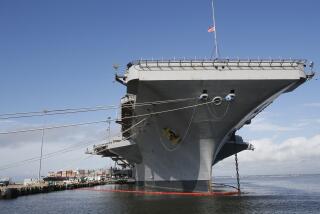Suicide of an Admiral, Exploitation in the Press
- Share via
WASHINGTON — Adm. Jeremy M. Boorda’s suicide stirred deep currents in Washington. It brought political types face to face with human mysteries they prefer to ignore. It also illustrated the poisonous pressures on today’s military. Finally, it illuminated some people’s stunning willingness to exploit these human flaws and political cleavages.
As for human mysteries, Boorda’s story reveals a man of awesome achievement and awesome isolation. He was, of course, the first enlisted man to reach the peak of the Navy’s command structure. He did so with official encouragement--and unofficial resentment from some of his Naval Academy-trained fellow officers. He was short and often joked about it--which meant he often thought about it. He was a Jew in an institution with its share of anti-Semitism. By age 18, he was married; the first of four children was born severely disabled and cared for at home.
Yet, after Boorda’s suicide, his colleagues could remember no sign of imbalance or lapsed control. The philosopher Yogi Berra once remarked, “In baseball, you don’t know nothing.” The same can be said of what we know about most people we work with. We can never foresee how an individual will respond to actions that touch him or her deeply.
As for the politics of the Navy that Boorda had to run, they were especially serpentine, because they were--and are--entwined with gender politics. First came the Tailhook scandal; but Tailhook was followed by a seemingly unending series of sexual-harassment controversies and by concerted efforts from both Congress and the executive branch to see that perpetrators were punished severely enough.
Boorda was in the middle of the struggle. To the politicians, he was the number to call to begin an inquiry or make a threat. To some defenders of the Navy, reasonably steamed at the length and severity of the collective punishment imposed on their organization, Boorda allowed it all to happen.
Other Pentagon bigwigs also participated in the Navy’s decisions to bow to the Clinton administration and Sen. David Durenberger. This process is called civilian control of the military, and it dictates that the person to blame is President Bill Clinton--who is, as his lawyers have recently reminded us, commander-in-chief. But Boorda was an easier target; and the issue was one that defies attempts to impose moderation in debate.
On the matter of exploitation, first recall White House aide Vincent W. Foster Jr.’s famous suicide note. In it, he said that, for the media, ruining people was considered sport. He was referring to editorials about him. Even though the purpose of editorials is to express partisan opinion and put as sharp a point on it as possible, many commentators seconded Foster’s verdict. Yet, if editorials are criticized for excessive bloodthirstiness, the same should hold true for journalism that purports to be objective, fair and without partisan agendas.
The suggestion that Boorda was not entitled to wear his two combat “V’s” seems to have originated--of course--within his own organization. From the Pentagon it made its way to the National Security News Service, founded by a former leader of the nuclear-freeze movement to develop investigative stories about the military. The focus is on misfeasance and malfeasance. Once NSNS has developed stories, it passes them on to mainstream news media. As the group’s Washington bureau chief explained, “I have to go around town beating up on my friends, saying, ‘Dammit, look at this story and do it.”’
The bureau chief said Boorda’s suicide was “tragic and sad. But it’s the kind of story we do.” Fair enough; other journalists know enough about the news service to be aware of the need not just to check its facts but to make decisions about the extent they want to be governed by its agenda.
From NSNS the “V’s” story went to controversial magazine columnist David Hackworth, who has never been accused of lacking agendas of his own. Hackworth told his editor at Newsweek, as this editor put it delicately, that the charges “could affect [Boorda’s] continuity in office.” Newsweek then followed journalistic form, asking for an interview with the admiral to hear his response to the charges. By the time Newsweek requested the chat, Boorda, hearing there were doubts about his “V’s,” had not worn them for almost a year.
The magazine now says everything it did was within the bounds of journalistic ethics. That is probably true--but hardly settles the moral questions involved.
According to news coverage after the suicide, Boorda, leaving “V’s” aside, was an exemplary officer. The coverage also revealed that the rules on “V’s” during the Vietnam War were confusing enough to provide rationales for widely differing views of who was entitled to wear what.
With these circumstances in mind, imagine that the worst construction of Boorda’s actions was true--that his ships, though near Vietnam, didn’t get shot at, and that he wore combat “V’s” he knew were unauthorized. Was this a matter of general national interest?
A clue to the answer lies in the fact that publications devoting major space to the story have usually included a sidebar or discussion of “What the Medals Mean”--complete with close-up photographs of Boorda’s ribbons, the foreign territory being explored. This journalistic treatment is necessary because few civilians have the foggiest notion of what goes on inside the fruit salad. Military people do care a great deal about the decorations, but don’t seem to care in an obsessively ritualistic way: For every military source quoted saying Boorda’s error was unambiguously humiliating, there is another who says the “V’s” were of secondary importance, or that Vietnam-era rules or practices were so contradictory that no one can ever untangle them.
In fact, the journalistic fuss about the medals was raised primarily by parties whose own reverence for the military is suspect. The question of medals was used to hurt a man who cared intensely about them--but it was used against him by organizations whose behavior has given little evidence that they care much at all about tradition, order or honor, as the military defines these things. Some journalists, perhaps decorated themselves, will protest that they did not share this cynicism or act in a manipulative spirit. If so, they have been used.
Even the strongest individual has vulnerabilities. This is no reason to forego criticism, but it is reason to treat the obligations of fairness and proportionality as serious ones. When emotionally bitter cultural politics are involved, there is special reason for everyone to mistrust the motives of those peddling stories and lobbing grenades.
Journalists, for better or worse, have to perform most of this moral triage. To say this is to demand of them a self-censorship and self-abnegation that we do not ask of other people in politics. But that is too bad. Today, if a decent sorting-out is to be done at all, there is no place other than the press to do it in. Journalists who don’t want to take the moral heat should get out of the professional kitchen.*
More to Read
Sign up for Essential California
The most important California stories and recommendations in your inbox every morning.
You may occasionally receive promotional content from the Los Angeles Times.













